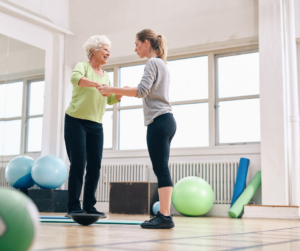
Caring for aging parents can be challenging on many levels. In the third of her series, “What to Expect When Your Parents Are Aging,” Seniors Guide writer Terri L. Jones shares caregiving advice from children who have been there.
Back when you were raising your kids, you may have read some books, taken a class or two, or at least talked to other parents about what to do and what not to do. Now, your parents may need the same level of care from you. But rather than arming yourself with knowledge, you’ve probably chosen not to think about it, much less do anything about it!
So that you’re not left in the lurch during this challenging time, we’ve compiled some insights from adult children who have had to learn their lessons the hard way. By sharing their advice on caring for aging parents, we hope to save you some of the missteps and help make this time with your parents a little less stressful and a whole lot more special.
Read the entire article HERE for more detailed information.
This information provided courtesy of Seniors guide By Terri L. Jones.


 In her series, “What to Expect When Your Parents Are Aging,” Seniors Guide writer Terri L. Jones looks first at the stages of aging. After all, foreknowledge better equips us for the road ahead.
In her series, “What to Expect When Your Parents Are Aging,” Seniors Guide writer Terri L. Jones looks first at the stages of aging. After all, foreknowledge better equips us for the road ahead.


 About eight million Americans have balance problems and one in three Americans over age 65 will fall every year. Injuries from falls, like a fractured hip, can change a senior’s life in ways senior fear most—isolation and loss of independence. For seniors and caregivers, understanding balance disorders and fall prevention along with knowing when to get help can go a long way toward avoiding falls and the devastating consequences that may come with it.
About eight million Americans have balance problems and one in three Americans over age 65 will fall every year. Injuries from falls, like a fractured hip, can change a senior’s life in ways senior fear most—isolation and loss of independence. For seniors and caregivers, understanding balance disorders and fall prevention along with knowing when to get help can go a long way toward avoiding falls and the devastating consequences that may come with it.
 Today’s 55+ communities offer more advantages to active adults and seniors than ever before. They are also easy to find. In fact, chances are good that you currently live near an age-qualified retirement living community. But, even if you don’t, it’s fun to contemplate the many exciting locations and lifestyle opportunities that such communities are known for. They frequently offer a no-fuss style of living that’s ideal for vital adults who want to keep experiencing some of life’s greatest joys.
Today’s 55+ communities offer more advantages to active adults and seniors than ever before. They are also easy to find. In fact, chances are good that you currently live near an age-qualified retirement living community. But, even if you don’t, it’s fun to contemplate the many exciting locations and lifestyle opportunities that such communities are known for. They frequently offer a no-fuss style of living that’s ideal for vital adults who want to keep experiencing some of life’s greatest joys. As we age, some of us eventually lose the ability to handle our own affairs. That’s why you’re smart to find out how to get power of attorney (POA) for a parent who is sick, disabled, or experiencing mental decline. But even if your parent is in good health right now, it’s wise to plan ahead for potential challenges. You simply never know when an injury or illness may take away your mom or dad’s capacity to manage finances or make important decisions about medical care. In fact, the best time to start considering power of attorney is before a parent requires any caregiving.
As we age, some of us eventually lose the ability to handle our own affairs. That’s why you’re smart to find out how to get power of attorney (POA) for a parent who is sick, disabled, or experiencing mental decline. But even if your parent is in good health right now, it’s wise to plan ahead for potential challenges. You simply never know when an injury or illness may take away your mom or dad’s capacity to manage finances or make important decisions about medical care. In fact, the best time to start considering power of attorney is before a parent requires any caregiving.